 |
Janakpur-based professor Surendra Labh says Madhesi leaders changed their language once they gained power. He argues the constitution, legislation and mentality of leaders must be changed if Madhesi issues are to be addressed.
 |
The government should come up with an immediate relief package for the people. It is sad to know that the movement was purely for power and not for the people," he says.
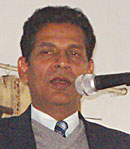 |
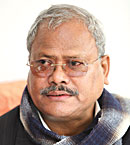 |
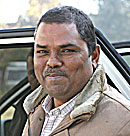 |
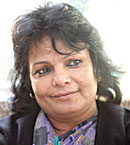 |
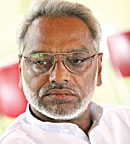 |
He blames the government for the violence as it failed to come up with an integrated vision for the armed groups and address the reasonable demands of Tarai armed groups in spite of his proposals.
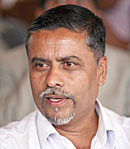 |
Rameshwar Kapadi, president of Mithila State Struggle Committee, says the Madhes problems have remained unaddressed thanks to the popular political slogan of 'one madhes, one pradhes' which overlooked geographic, ethnic and cultural diversity. He also claims the Madhesi leaders joined the government with the right sentiment but they did not understand the real problems.
Perhaps everyone is expecting too much too soon given the seismic changes this scarred country has undergone.
But the ministers themselves are not taking the initiative to bring relief to the people when they say the government can do nothing. Madhesi represent a hefty one third of the leaders in the council of ministers.
The country's president, vice president and Madhesi ministers hail from Sarlahi, Dhanush, Saptari, Sunsari and Morang districts - the origin of Madhes movement. It shows the effectiveness of the movement and its achievements. But the people who were in the frontline during the movement in these districts are now living under constant threat.
"We will have one identity?Nepali"
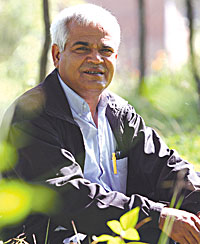 PICS: KIRAN PANDAY |
What are the merits and demerits of federalism?
No political system is good or bad in itself. There is no ideal system. But the country might face some challenges once it embraces federalism.
The issue of ethnicity could be one while the division of provinces could be another. Ethnic, linguistic and regional issues need to be taken into consideration when dividing provinces but they are not the sole determinants.
Let's take Limbuwan province for instance. There might be people who think non-Limbu should not be allowed to live there, that they should be driven away. This is against the spirit of federal democratic norms.
The emergence of regional parties will be inevitable if the issues of identity remain unaddressed. That's not to say regional politics is wholly bad but possible challenges should be identified on time. If political parties do not adapt to fit the federal system, that could pose another problem.
Federalism is expensive as there will be many governments and parliaments. But there again the federal system could promote economic growth.
There are many challenges, which is why political parties appear reluctant to embrace it.
Some argue the country would break up if it goes into federalism.
The past experiences of federal countries do not prove so. Yugoslavia disintegrated because the federal system was not based on democratic norms. India is a federal country which has been facing the problem of separatist movements from the very beginning but it has not disintegrated in over 60 years. In 1947, the separatists demanded independence for Tamilnadu but the issue evaporated when MDK party won. From Nagaland to Manipur, the issue of separatism is being raised but the state mechanism has been functioning perfectly. In other words, it is through federalism that integration has been protected.
With the exception of Tarai Democratic Front, no other parties or groups have raised the issue of a separate province so far.
How should provinces be created?
In more than one way. In India, federal structures are based on language (Gujrat, Tamilnadu etc), geographical situation (Uttar Prades, Madhya Prades etc) and ethnic settlement (Punjab, Bangal etc). The provinces should be created according to the density of the population and topography.
National unity is also important. The state should be self-reliant in terms of economy, administration and internal security. It should be capable of implementing central government policies, programs and plans.
It must be considered whether a province is viable politically and administratively. For instance, a separate province of Chepang with a population of 50,000 could not be administratively and politically viable.
What are the widely accepted norms of federalism?
There are essentially two concepts of federalism that are widely accepted?territorial and non-territorial. America is an example of territorial while Ethiopia is non-territorial. Under the former, provinces or states are demarcated in a certain size and their inhabitants are known as citizens of that particular province. The latter refers to demarcating provinces on the basis of ethnicity.
In Nepal, it is not possible to apply either so the federal structure of our country should be based on ethnicity, language, population density and geography.
What are the basic requirements for a federal system to function?
The basic principles of a democratic system apply. The only difference is the level of ruling. In a federal system, there are different governments and parliaments at the centre and provinces. The duties and responsibilities of the central and provincial government will be as provisioned in the constitution. In many federal countries, the provincial government has a different constitution from that of a central government, while some have a single constitution. In America, Canada and Switzerland, provinces/states have their own constitution. If any state wants a separate constitution that should not be negated.
Another important question is about the type of system. It could be presidential, parliamentary or mixed. I think an executive presidential system will not be appropriate because of the diversity. Under the presidential system, it is unlikely Dalits, women, Madhesis or Tharus would be elected. We need a ceremonial president and an executive prime minister.
What should be the political, economical and administrative relationship between the central and provincial government?
The constitution will specify the fundamental relationship. Some responsibilities will be shared, some separate. For instance, the issue of environment. When it rains in the mountains, landslides takes place in the hilly regions and the Tarai suffers from flash floods. These are shared issues.
In principle, defence, foreign affairs and treasury remain at the centre and the rest goes to the provincial government. Hydropower can be of national interest. In this situation, the central and provincial work together.
We should understand one thing ? the centre is not a separate entity without provinces. The central government consists of representatives from provinces. No laws are made without the participation from provinces. The centre is the common ground.


